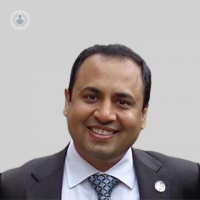Diverticular disease: ask an expert!
Autore:Diverticular disease may not be cancerous, but it can cause some distinctly unpleasant symptoms in the gut, including diverticulitis (inflammation). But what is this condition? We asked experienced colorectal surgeon Mr Ash Prabhudesai, who provides this expert guide.

What is diverticular disease and who is likely to have it?
Once a disease of senior citizens, diverticular disease is now commonly seen in the younger population, at times in people in their twenties and thirties.
It involves development of pouches (diverticulae) in the bowel of the large bowel (colon), particularly in the sigmoid colon, which is situated on the left lower quadrant of the abdomen. It is associated with an increase in the pressure within the bowel, causing these pouches to develop. A rise within the lumen of the bowel is attributed to increased intake of refined food, and a paucity of fibre and fluid in the diet. This, in turn, gives rise to hard stools requiring the bowel to work and push harder, causing thickening of the walls of the large bowel and development of the pouches (diverticulae).
Historically, it has been a disease found in Western countries, with it being rarely seen in West Africa, for example, where the diet includes a large proportion of fibre. However, with globalisation and change in dietary trends the world over, this disorder has now become global.
What are the symptoms of diverticular disease?
Just the presence of diverticulae may not cause any symptoms, and it is said that only 10-20% of patients with diverticulae in their colon may develop problems related to it.
Abdominal pain, especially in the left lower quadrant of the abdomen, is a common symptom. This may be in the form of recurrent cramp-like pains due to a relative narrowing of the colon. It may also present as continuous severe pain, which may suggest inflammation of these diverticulae (diverticulitis), requiring emergency hospital admission. The diverticulae might also rupture, causing a leakage of the bowel contents into the belly, and peritonitis, which may require urgent surgical intervention.
Sometimes, diverticulae may erode into an adjacent blood vessel, and present with profuse bleeding from the back passage.
Alternating diarrhoea and constipation are also a common feature of diverticular disease. Cancer of the large bowel may present in a similar way, but diverticular disease is not a precancerous condition (although risk factors of these two conditions are quite similar). Due to the narrowing of the colon, this may lead to a blockage (stricture) in the bowel.
In certain situations, the diverticulae might rupture, causing a communication (fistula) with the urinary bladder, which can lead to recurrent urine infections (the cardinal symptom being passage of gas bubbles in the urine), or into the vagina, with foul smelling discharge.
How is it diagnosed?
From your history, if your doctor suspects diverticular disease or wishes to rule out bowel cancer if there is a change in bowel habit, a colonoscopy should be arranged. Alternative methods of assessing the colon include a virtual colonoscopy, which is a special CT scan. In an emergency presentation of diverticular disease, a CT scan may be carried out. In a CT scan for any other indication, diverticular disease may be picked up.
How is diverticular disease treated?
As mentioned earlier, most people with diverticulae are not troubled by it. Symptoms may be controlled by avoiding constipation and increasing roughage in the diet. There is some evidence that probiotics may help to prevent recurrent episodes of inflammation in the diverticulae.
If the diverticulae have ruptured, one may require an emergency operation. If there is bleeding as a result, special methods using imaging are used to block off the offending vessel.
If one suffers from recurrent episodes of diverticulitis or has developed a fistula, one may have to have that part of the colon surgically removed.
There is now enough evidence that a diet high in fibre in the form of fruits and vegetables, and a reduction in refined carbohydrates will prevent the incidence of diverticular disease and its related complications.


